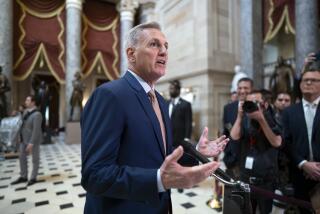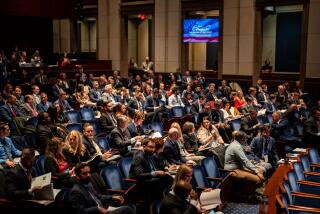Effort to Overhaul Lobbying Gets a Chilly Reception
- Share via
WASHINGTON — House Republican leaders vowed Wednesday to push ahead with an overhaul of the chamber’s lobbying rules despite objections from GOP colleagues to a temporary ban on privately funded travel and other proposed changes.
“We need to bring about bold, strong reform,” said House Rules Committee Chairman David Dreier (R-San Dimas), who put together a package of regulations to make it tougher for lobbyists to exert undue influence over lawmakers.
But resistance from many House Republicans -- coupled with the decision by Senate GOP leaders last week to indefinitely shelve the Senate bill tightening lobbying law -- has government watchdog groups questioning whether Congress will significantly alter its lobbying rules.
“Members of Congress have made this drastic step back from where they were three months ago, when Jack Abramoff was indicted and people were vowing serious reform,” said Mary Boyle, spokeswoman for the citizens’ lobbying group Common Cause.
Abramoff, a Republican lobbyist, pleaded guilty in early January to federal charges of fraud and conspiracy to bribe members of Congress. He is cooperating with federal prosecutors in a larger probe of Capitol Hill corruption.
Abramoff’s guilty plea inspired a push for sweeping rule changes, including a ban on congressional travel paid for by interest groups. But as lawmakers have focused on such proposals, their enthusiasm for them has cooled -- as illustrated by the opposition among the House Republican members to prohibiting privately funded trips through the end of the year.
GOP House leaders want to impose the travel moratorium to give the chamber’s Ethics Committee time to formulate a preapproval system for privately funded trips by lawmakers and their staff members.
But rank-and-file Republicans expressed concerns that the moratorium would bar them from accepting invitations to speak at graduation ceremonies. And some complained that a preapproval system would give the leadership too much power.
Another criticized measure would require lawmakers to disclose “earmarks” -- federal funds steered to special projects, sometimes at lobbyists’ behest.
House Majority Leader John A. Boehner (R-Ohio) has said such a requirement would reduce the number of earmarks members sought. But many lawmakers defend such funding as an important service to constituents.
The chairman of the House Appropriations Committee, Jerry Lewis (R-Redlands), has led the fight against efforts to hamstring the earmark process.
Such criticism “reflects the sense of a lot of members that earmarks do a lot of good in their districts,” Appropriations Committee spokesman John Scofield said. He added that lawmakers “want to ... do some reforms, but there are a variety of ideas out there and there doesn’t seem to be any consensus.”
Dreier’s package of proposals, which he fashioned at the request of House Speaker J. Dennis Hastert (R-Ill.), also calls for doubling to four times a year the frequency of public reports lobbyists must file on their gifts and donations to lawmakers. Another provision would limit the contributions individuals can make to political organizations known as 527s, named for the section of the tax code that governs them; currently, these groups can accept unlimited donations.
GOP House leaders began working on the legislation in January, shortly after Abramoff’s guilty pleas. Yet they encountered strong criticism when they unveiled it to colleagues behind closed doors Wednesday.
“There is a lot more work to do with members,” Rep. Ray LaHood (R-Ill.) told reporters after the session. He described the meeting as “muddled and confused.”
One Republican leadership aide acknowledged the unhappiness among rank-and-file members, but said the leaders were determined to press on.
“Anytime you’re going to have a bill that’s going to affect members in even the tiniest ways, you are going to have people who are unhappy,” said the aide, speaking on condition of anonymity when discussing the attitudes of lawmakers.
Rep. Dan Lungren (R-Gold River) said the leadership warned members that if they did not accept the package, Democrats would propose tougher measures and Republicans would have to accept them or appear to oppose reform.
More to Read
Sign up for Essential California
The most important California stories and recommendations in your inbox every morning.
You may occasionally receive promotional content from the Los Angeles Times.










